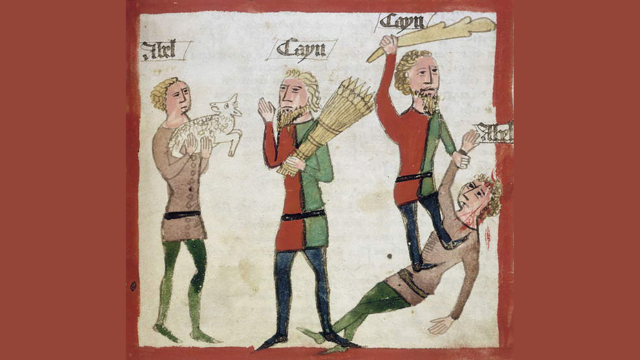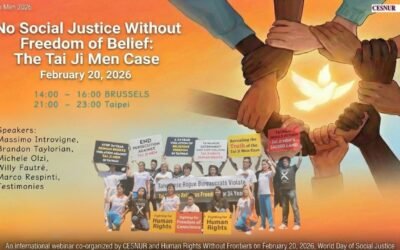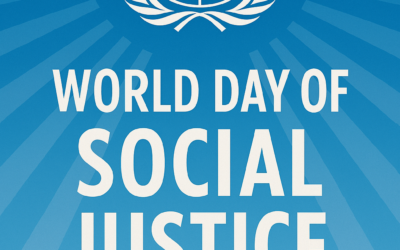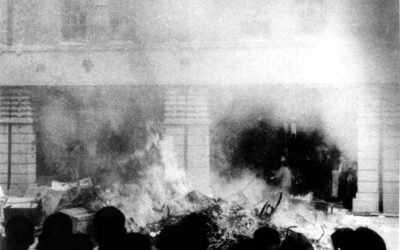In international politics and agitated societies, compromise and appeasement feed more conflict, deepening injustice.
by Marco Respinti*
*Conclusion to the webinar “No Peace Without Justice for Tai Ji Men,” co-organized by CESNUR and Human Rights Without Frontiers on September 21, 2025, United Nations International Day of Peace.

The world is in great turmoil. Wars and divisions slash humanity, too often pitting neighbor against neighbor, siblings against siblings, and parents against children. We live in dire times because of the many conflicts that tear the world apart. Yet it seems that this is humanity’s usual condition.
According to the Judeo-Christian Bible, humanity started going astray right after the creation of the first man and the first woman, and a gigantic step forward in evil was rapidly made by one of the two sons that our progenitors, and first sinners, brought to life: Cain killed Abel. A brother slaughtered his own brother. Not an enemy, not a stranger, not an alien: his own brother, flesh of his flesh, son of his same father and mother. It was the first homicide in human history, and it was immediately outrageous.
Different cultural and religious traditions worldwide have similar tragedies in their holy scriptures, passed down through oral narrations, and revived through myths and rituals. Settings, names, conditions, and details differ, but the core remains: humans are good beings who perform evil deeds.
If we were to analyze the evil that human beings do, in search of its essence, one cogent conclusion to which we would surely arrive is that the very nature of human evil is injustice.
Homicide, brutality, war, and theft are all faces of injustice. So are pride, greed, lust, envy, gluttony, wrath, and sloth. Under one aspect or another, all crimes and capital sins that human beings can devise and perform subtract from and deny parts of the universal architecture of justice that governs the world as it should be. All human misdeeds are acts of injustice: toward God, fellow human beings, and nature.
Injustice may then be considered the real essence of human evil, and the supreme evil of injustice brings about ruptures, breaks, and splits—in other words, the contrary of peace.
Peace is not some Arcadian utopia that exists only in dreams, never to be achieved in reality. Peace is instead the reign of justice.
Of course, peace may be difficult to achieve because human beings cannot perform perfect justice. Yet human beings should always aim for perfect justice to have real peace. They should always believe in perfect justice, advocate it, teach it, and operate as if perfect justice could be reached tomorrow. This is not another form of utopia. It is total abnegation in the name of an absolute moral value.

The Tai Ji Men case is a concrete example of this philosophy. It is crystal clear that the injustice done to Tai Ji Men over decades causes inconveniences and distress incompatible with true peace, both to Tai Ji Men’s Shifu, or Grand Master, and dizi, or disciples, and to Taiwanese society in general. Peace in society will never be attained unless the injustice done against Tai Ji Men is fully redressed. And it is also clear that half justice is only half peace—hence, not real peace.
In the face of the bloody wars that are mangling the world right now, many advocate for peace. A just peace, they argue, is impossible, so let us have at least something when we cannot have it all.
Their reasoning is motivated by the cruel spectacle of daily bloodshed that seems never to end. They think that asking too much will result in obtaining nothing. They are convinced that evildoers are so stubborn that they will never give up their violent acts. This may be a realistic approach, but it conceals a pitfall.
Being content with a possible peace now can, in fact, be a compromise that preserves the status quo. But the status quo amidst injustice—a totally absurd and unlawful procedure as in the Tai Ji Men case, or a crude war such as that waged by the Russian Federation against Ukraine—means conceding to the aggressor the retention of its position, i.e., its plunder.
Advocates of a compromise peace maintain that a just peace is only an ideal aim, never to be attained, and that waiting for a just peace tomorrow instead of a potential peace now sacrifices too much on the ground.
This position contains a grain of wisdom and should not be dismissed ideologically, but should not be made absolute.
Should, for example, Tai Ji Men abandon its request for total justice to accept a mere compromise that, at the end of the day, secures the spoils for those who, for decades, have violated the law and disregarded the rulings of all levels of Taiwanese justice, including the Supreme Court? Should Tai Ji Men stop halfway, exchanging a quiet life for real justice? Should Tai Ji Men give up its property and sacred land, acquired at the price of personal and communal sacrifice by Shifu and dizi and now illegally nationalized by the government?
Someone would say yes, as an indispensable condition to obtain a decent level of tranquility and be left in peace. It is not a perfect peace, but—again—a form of peace that is enjoyable now.

Unfortunately, this illusion often transforms itself into a blatant defeat. This is called appeasement in international politics, and it has never achieved good goals. On the contrary, rogue regimes and governments have systematically lured their enemies into this trick to secure their objectives.
In cases like Tai Ji Men’s, appeasement would give two terrible impressions: the first is that dizi are not convinced of their own claims, and the second amounts to an invitation to those corrupt bureaucrats who have been harassing the movement for decades to continue their offences.
Enemies of justice and peace are ravenous subjects. If one gives them a portion of food, they want all the rest. If we provide them with the possibility of peace, they will devour the word “possible” to transform it into an unattainable peace. They will devour agreements and redouble injustice if we give them compromised justice.
For this reason, the only peace that is possible is that offered by full justice. This is true in international politics, within disordered societies, and all the more so in the Tai Ji Men case. Total justice for a just peace—or nothing. This is the only possible message on the United Nations International Day of Peace.

Marco Respinti is an Italian professional journalist, member of the International Federation of Journalists (IFJ), author, translator, and lecturer. He has contributed and contributes to several journals and magazines both in print and online, both in Italy and abroad. Author of books and chapter in books, he has translated and/or edited works by, among others, Edmund Burke, Charles Dickens, T.S. Eliot, Russell Kirk, J.R.R. Tolkien, Régine Pernoud and Gustave Thibon. A Senior fellow at the Russell Kirk Center for Cultural Renewal (a non-partisan, non-profit U.S. educational organization based in Mecosta, Michigan), he is also a founding member as well as a member of the Advisory Council of the Center for European Renewal (a non-profit, non-partisan pan-European educational organization based in The Hague, The Netherlands). A member of the Advisory Council of the European Federation for Freedom of Belief, in December 2022, the Universal Peace Federation bestowed on him, among others, the title of Ambassador of Peace. From February 2018 to December 2022, he has been the Editor-in-Chief of International Family News. He serves as Director-in-Charge of the academic publication The Journal of CESNUR and Bitter Winter: A Magazine on Religious Liberty and Human Rights.



